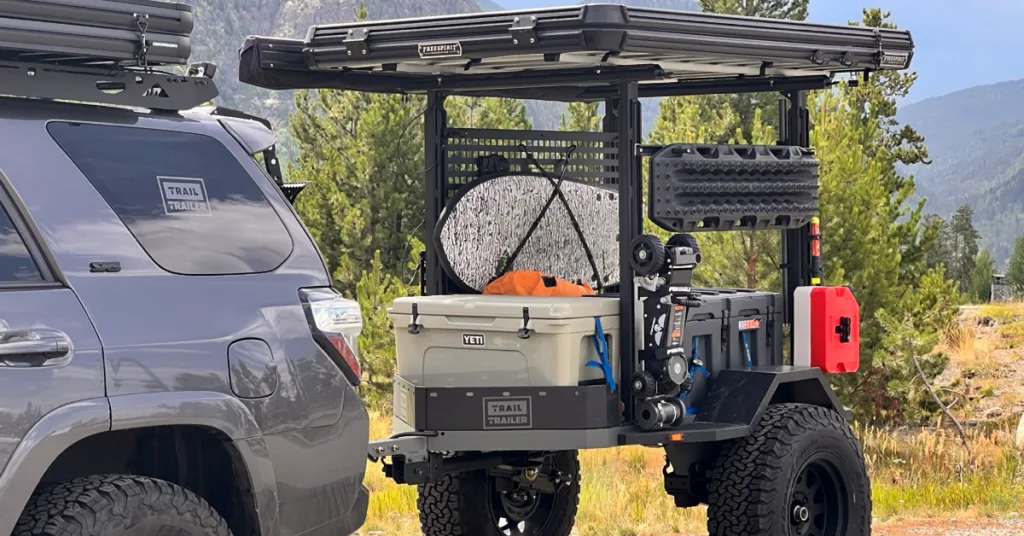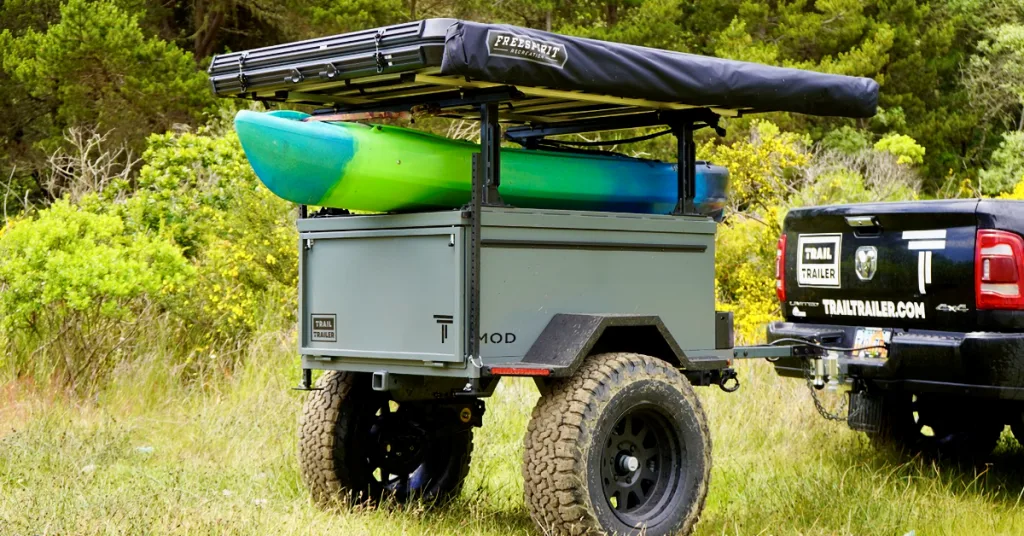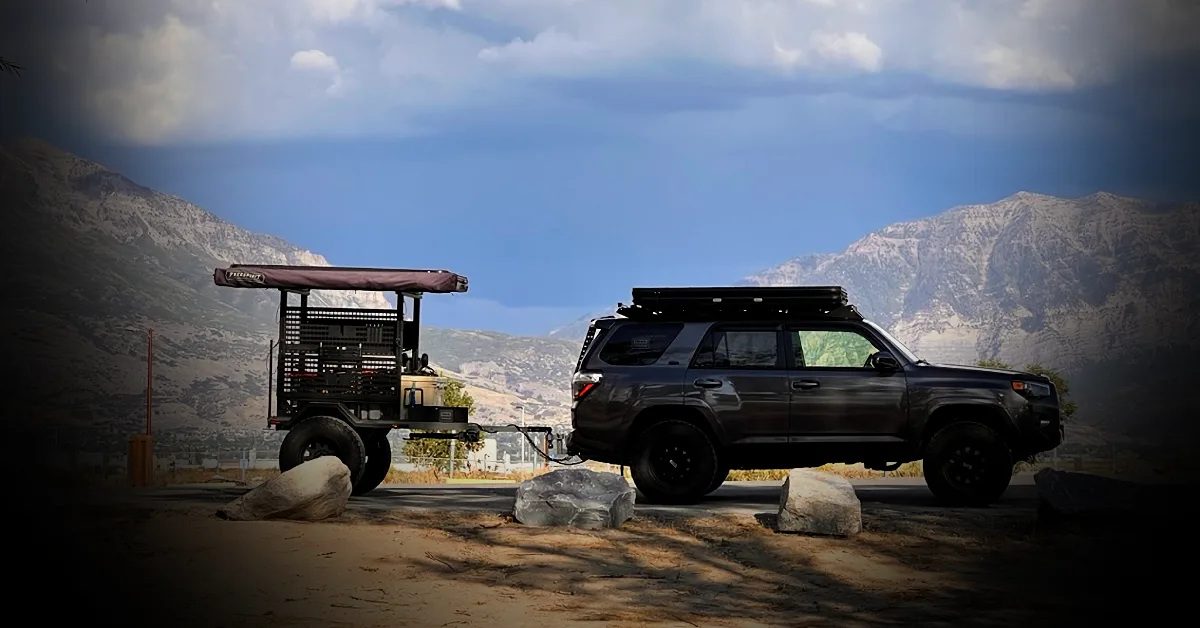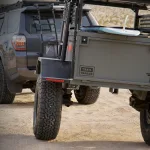Not All Modular Off-Road Trailers are the Same
There are many makers of offroad trailers claiming to have “modular” systems.
The premise is that modular offroad trailers can be customized to any style of adventure.
At Trail Trailer we make that claim, too.
But a review of the off-grid trailer market reveals really loose definitions of “modular” out there among trailer-makers.
For some trailer manufacturers their “mods” are not really mods at all.
They are, instead, just really expensive accessories. Any trailer can be accessorized — but to be modular means something else entirely.
A “mod” is a component that changes the carrying capacity and the use of a trailer. It does not accessorize, in and of itself.
This is important to remember when you are building your perfect overlanding rig.
~ Where does this confusion come from? ~
Why has the term “modular trailer” become somewhat confused?
It has happened because the term “off road adventure trailer” keeps getting defined in ever expanding ways.
An adventure trailer can be like ours – a military-inspired trailer made to haul things overland to survive completely off-grid. Or an adventure trailer can be a camper-style trailer intended for off-road destinations that can be an all-in-one answer to ditching the tent completely.
Depending upon your preferred off-grid style there can therefore be completely diverse definitions of “modular”.
We want to clear up the confusion this all generates.
It begins with understanding how adding a trailer changes how offroad is done.
~ Differences in Off-Roading with a Trailer ~
Taking any kind of trailer offroad changes the very nature of off-roading.
There are significant trade-offs one makes by adding any kind of trailer:
- Change in gas mileage efficiency – “getting there” usually involves at least significant highway travel. A trailer is going to adversely affect your mileage on any road.
- Shorter range – That reduced mileage means once you get off-road you will have shorter range.
- Slower speeds – A third set of tires means getting over obstacles, through water, and beyond, will take longer.
- Expanded turning radius – you may not be able to turn around as quickly or easily on the trail because you simply will need more room for the length of your outfit.
- Restricted accessibility – Where you might go remotely could be limited simply because some areas are not conducive to trailers.
These trade-offs have to be considered, especially if you’re used to carrying all that you need or want in just an off-road truck.
It is challenging. How can you take all that you want and need in a remote camp and still get there?
That’s the challenge all these trailer types are trying to answer with their varied designs and modular systems.
~ A Camper Vs. A Trailer ~
Not all trailers are the same.
We sell trailers made for off-road customization. At their base level there are no lights, no water systems, no plumbing, no power grids, no beds, no kitchens, and no electronics outside of trailer lights.
It is a blank slate – ready for you to shape from the ground up for whatever you deem necessary on the trail.
Our trailers are made to hold stuff that endures the rigors of the off-road trail.
You decide what that stuff is and we have various “mods” to help you put it together.
Many confuse our style of trailer to other so-called adventure trailers that are, in reality, just RVs without an engine. Campers, in other words.
Camper trailers are box-like enclosures designed to give you all the creature comforts of home.
Some of these campers feature the same independent suspension, the same rugged tires and the same promise of go-anywhere off roading that our style of trailers offer.
But they are not the same.
They are campers first.
There is a world of difference when taking a trailer camper offroad.In fact, a camper on a trailer isn’t much different than a camper on a truck.
It’s a camper.
It comes with its own unique set of performance issues when you go offroad:
- Road Clearance – Even a small difference will matter. Some off-road camper trailers offer good clearance – but many do not. Do your research and think hard what 6, 8 or 10 inches or more might make where you travel.
- Trailer weight – A camper with associated water and power systems, kitchens, bedrooms, windows and furniture weigh a great deal more. That changes off-road driving considerably.
- Height – Some camper designs go beyond the vertical footprint of the vehicle pulling it. This too limits some off-road accessibility (especially if you don’t want that camper to take a beating)
- Maintenance – Walls, floors and ceilings all have to be maintained and protected from water, heat and sun exposure. Seasonal storage, especially with plumbing, is labor intensive.
These distinctions are important in many ways.
How you build, design, modify and accessorize a camper will be different than doing the same for an off-grid trailer.
Can a trailer go more offroad than a camper adventure trailer?
Yes. Of course, Naturally. That’s the whole point of not taking a camper in many real offroad situations.
There are just some places you would never take a camper. It doesn’t matter how much they bill it as offroad. It is just common sense.
It will really come down to where you like to go and what you want to happen when you are remote. For many, the trade-offs are worth it because their destinations generally make taking a camper possible.
The idea of true offroad trailers (not campers) comes from the military. They just might know a thing or two about offroad adventure.
We cannot say, despite our bias, that one trailer over the other is “better”. They are just different products designed to work differently.
The big thing is to do your homework so you understand the limitations and potential of both product types.
~ But what about modular designed trailers? ~
All of the above brings us back to the original question about modular trailers.
Just as all trailers are not the same, so too are “mods” different based on the trailer type you choose.
For campers, think of mods as entire units – bedrooms, kitchens, bathrooms, etc.
For off-grid trailers, think of mods as storage capacity and rig add-ons such as tents and stoves.
Our trailers have mods that provide a huge variety of options.

Our two primary mods are the tall and the short towers.
The tall tower extends the height of your trailer. It gives you room off the sides and over the top to accessorize with additional molle panels, roof top tents and other features you customize to your needs.
But just as with a tall camper, the tall tower may match or even exceed the height of your truck – a fact that may matter on the trail.
The tall tower mod does not add lights or power or storage or bathrooms or kitchen sinks. It just makes your trailer higher profile so you can accessorize that other stuff to your heart’s content.
The small tower mod is actually a different take on the tall concept.
It’s short because it is anchored most often by the gear tub – another mod that greatly increases the dry storage capacity of your trailer.
The short tower is bolted to the gear tub, giving you a trailer that is the same height as what you would get with the tall tower alone.

These “mods” allow you to outfit your trailer in ever more flexible ways.
No matter how you mod your rig we humbly suggest you research, measure, ask questions and touch and feel.
Realize that modding a trailer like Trail Trailer will be vastly different than modding a camper trailer.
It goes beyond life on the trail, too.
Costs in modding the two types of trailers are going to vary widely, too.
At present pricing, our most popular trailer, the MOD PV, will top out fully modded around $13,000. Most camper trailers are $30,000 or more without a thing added to it, whether it is a mod or an accessory.
So avoid the temptation to compare off-grid adventure trailers to adventure camper trailers.
They just are not the same.
See posts like this in your email. Subscribe today!





Leave a Reply
Want to join the discussion?Feel free to contribute!